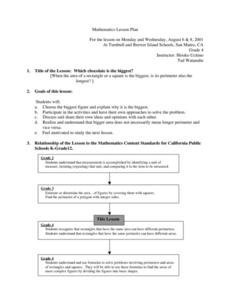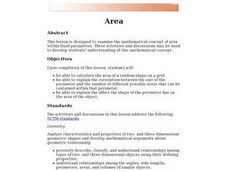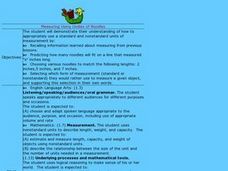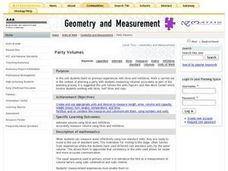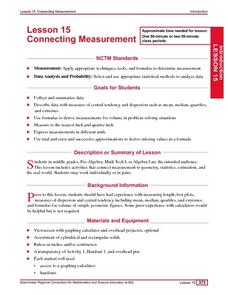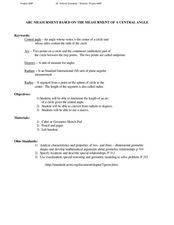Curated OER
Making It Balance
Students listen to story, "The 100-Pound Problem," compare their weight with character in story, and weigh different classroom items using nonstandard units and standard units. They experiment with different items that can make scale...
Curated OER
Math/Technology: Measuring Objects
Third graders create Powerpoint templates of pictures they have taken. Using both standard and metrric measurement units, they describe what units of measurement they would use for each object. In the computer lab, they work in pairs to...
Curated OER
Va Va Va Zoooommm
Students, in groups, measure a variety of physical components to several activities. They use both standard and non-standard forms of measurement and then develop conclusions about the use of units in measurement.
Curated OER
What Is Your Measure
Students engage in the study of measurement. They practice using different objects that can be found in class or brought from home. Students are introduced to the history of measurement. They compare and contrast the standard and metric...
Curated OER
How Many?
In this measurement learning exercise, students complete a 12 question multiple choice online interactive assessment about standard modern and ancient measurement.
NTTI
What Size Is It Anyway?
A fabulous plan on teaching basic concepts of measurement to young learners. Pupils use nonstandard units to measure length, practice using a ruler and a yardstick, compare the length of two objects, and perform estimations of length....
Curated OER
ExplorA-Pond: 4th Grade Perimeter Estimation
Your geometers are used to finding the perimeter of a square or rectangle, so give them something different this time! With this lesson, small groups will receive a picture of a shoreline and calculate the perimeter. The website listed...
Curated OER
Which Chocolate Is The Biggest?
Students investigate the concepts of area and perimeter with the use of chocolate bars. They calculate the perimeter and area of different size rectangle chocolate bars and record the statistics. Then students make a visual comparison...
Curated OER
Area Applet
Elementary math classes calculate the area of a shape and explain the correlation between the size of the perimeter and the areas that can be contained within that perimeter. They also explain the effect the shape of the perimeter has on...
Carnegie Mellon University
Battery Workshop
Introduce your class to the workings and parts of a battery-operated circuit. Pairs of pupils use lemons to make batteries and measure voltage and current with a multimeter. An accompanying worksheet is used for recording values and...
Teach Engineering
Bone Density Challenge Introduction
Can you use X-rays to measure bone mineral density? This is the essential question that learners must answer in the first installment of a seven-part series. They brainstorm ideas about necessary background information and what they...
Albert Shanker Institute
Economic Causes of the March on Washington
Money can't buy happiness, but it can put food on the table and pay the bills. The first of a five-lesson unit teaches pupils about the unemployment rate in 1963 and its relationship with the March on Washington. They learn how to create...
Curated OER
Measuring Using Oodles of Noodles
First graders explore and evaluate the use of both standard and nonstandard forms of measurement. They use noodles to measure the lengths of each line they have drawn. They glue the noodles to the page under the given line.
Curated OER
Basic Measurement for Welding
Students accurately measure pieces of metal. After reviewing basic math principles, groups of students identify proper and safe use of measuring devices. They discuss the safety procedures for other devices in the classroom. After a...
Curated OER
Customary Measurement Conversions
Fifth graders discover in hands-on activities the relationships between the measures. They work in groups to create conversion tables using familiar measuring tools. Students solve problems requiring conversions.
Curated OER
Party Volumes: Measurement
Second graders explore liters and milliliters. They estimate volume and accurately measure the volume. Students plan a party and measure volume using liters and milliliters as part of the planning process.
Curated OER
Connecting Measurement
Students participate in activities the connect measurement to geometry, statistics, estimation, and the real world. They collect measurements from their elbow to the tip of their middle finger and make a box plot of the data as well as...
Curated OER
Measuring to the Nearest Inch
Third graders use whole numbers and fractions to make connections between abstractions of the mathematical world and the real world. For this fractions and measurement lesson, 3rd graders identify, quantify groups , and measure...
Curated OER
Measurement of a Central Angle
Students calculate the measurement of a central angle. In this geometry activity, students identify properties of circles. They use Cabri software to create and analyze graphs.
Curated OER
How Will You Measure Up?
Third graders use the appropriate units of measure when given a list of items to estimate and measure. They work in cooperative groups to locate, estimate, and measure given items using the correct unit of measurement.
Curated OER
Measuring the Classroom
Learners measure their classroom and determine the area. They discuss the margin of error. Each class member will write up their results separately. Students must decide what measurements to make, and attempt to measure accurately.
Curated OER
Time Zones in the United States
Eighth graders explore how to use the time zones in the United States and internationally. They use elapsed time to solve problems. Students calculate the time in various places in the United States. They discuss the 6 time zones in the...
Curated OER
ALASKA-CANADA HIGHWAY PROBLEM
Students create a table of ordered pairs, using variables (dependent and independent), writing equations, converting metric and standard measurements for distance using mileposts.
Curated OER
Measurements in Science
Eighth graders demonstrate knowledge of metric tools by measuring common objects in the classroom. They discuss the various units of metric measurement and the scientific tools used to take them. They copy a metric ladder from a Web site.









